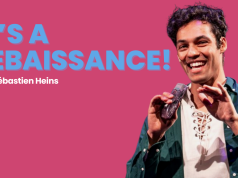Last post here friends. And I’m going to give it up to my gramps, his fourth and final hope for his children.
But before I do, I’ve made a few changes that I’ll explain. My grandfather was a minister in the United Church and so had a specific relationship to the idea of God. That word “God” doesn’t really mean the same thing to me, but I’m still captivated by the notion of Faith, a secular faith that for me underpins my belief in theatre to nourish our hope in humanity and to strive for a better, fairer and just world.
“My fourth hope for my children is the ground for the other three: that they will live by conviction; finding their place in the purpose of creation, and in the community of those who put their trust in creation; carefully cultivating the means by which their faith is nurtured; having the courage to act their faith in spite of apathy and opposition around them; growing in the spirit of love, which is the chief of the fruits of our world.
It is not that I want to lay these as heavy things on my children whether they want them or not. They are the chief things of my heritage, the best gifts I have to pass on. And so I offer them, knowing that they will make their own free response.”
Thanks everyone.
My third hope for my children is that they will feel a sense of responsibility for the world of the present and the future. There is always the temptation to use the gifts of one’s heritage for self-serving purposes. The urgent problems of our global village require the understanding and efforts of all people of goodwill. We are being challenged by the Third World, and by those Canadians who are being marginalized and victimized by the economic and social development policies of our own country. For my children to respond to these challenges means to be prepared to break with many of the prevailing attitudes and life-styles of our time.
My second hope is that my children will always be conscious of their place in our family. In the past the extended family provided a means of moral and psychological support for its members, both young and old. In our urban, industrialized society, when families are scattered widely, new ways must be found to keep in touch. If relationships are to continue, they must be nourished. Letters and visits and the rituals of family observance become all the more important.
Hi there, Brendan McMurtry-Howlett here. For today’s thought I’m going to have a guest posting from my grandfather (Doug McMurtry). He passed away at 97 about a year and a half ago but he wrote this piece in 1976 called The Hopes For My Children. Here is one section:
My first hope is that they may learn to find their place in the natural order of creation. The Indigenous people have shown us that to be in tune with nature is to find strength, relaxation, and a sense of identity, as well as a means of survival. The mountains and the sky, the prairies and the sea, the northland and the cultivated soil are a gift to be received with gratitude and respect.
I’ve been thinking more and more about embracing inefficiency. I have spent so much energy in trying to work more efficiently, build structures that promote efficiency, save time and money. But actually I find so much joy comes from inefficiency, the indirect route from a to b. There is beauty and magic and humanity in the inefficient. It seems to me an important form of resistance to the relentless drive of the world we live in.
I keep hoping I’ll one day feel like an expert at making theatre. But is is possible to feel like an expert at something that is supposed to be new and fresh each time you approach it? Every time I go to coach or teach or dramaturge or direct, I keep hoping I’ll one day show up with short cuts and ways of being really efficient, and having all the answers. But maybe that’s just capitalism trying to crush the beautiful inefficiencies of creation. Well, today capitalism lost and my inefficiency won the day.
Hi there, Brendan McMurtry-Howlett again.
I’ve been thinking about the idea of transcendence, and more specifically the transcendence of concept. What that means to me is when you hit that point in a project where you move beyond what you originally thought your project was about, to what it REALLY is about. It’s something I’m always striving for in my work, when I let go of whatever clever little ideas I was so proud of at the beginning and find something with some real depth. I’ve been thinking about this as Transcendence of Concept.
I’ve been thinking about and learning about the treaties and the nation-to-nation relationships that underpin the social, political, and legal fabric of this country Canada. I’ve started reading up on some of the treaty negotiations and agreements across this country, and it’s been really interesting, perhaps I should say revealing, to read the official Canadian Government accounts of the treaty agreements, and then the accounts of the first nation or nations who were the other side of that exact same treaties. It makes me consider my responsibility to these treaties that were signed by the government that represents me, but also my responsibility to the land on which each of these treaties were signed, and in many cases, which had a long history of treaties predating the processes with Europeans. It makes me think of my responsibility as an artist and storyteller to uphold the treaties that govern this land I’m on. And I guess I’m curious as to how many of you out there have actually read the details of the treaties that govern the land you live on.
PS. Great book to read – Unsettling Canada by Arthur Manuel!!!!!
Hi there, this is Brendan McMurtry-Howlett and this is my thought for the day.
I’ve been thinking about how much of the creative process, for me, is just about perseverance. To stick with a project, or idea, or piece of writing long enough that it stops feeling terrible and turns into something concrete that I don’t feel half bad about. I run into this all the time, but I can never say exactly what it is that I do that makes a project turn the corner into something interesting and concrete, other than… I just put in enough time. I find this to be both an exhausting notion, but also an encouraging one at the same time.”
When was it that we decided to try to fit theatre into the consumerist model of selling a product to the public? As a “product” Theatre has got to be the worst thing to try to sell – it costs a lot to create and has an unforgiving expiry date – if a seat in a theatre is not sold one night, you can never try to sell it again. Whereas a can of soup can sit on a shelf for months, even years.
I think theatre’s strength is that it offers an opportunity to be a part of a community and it seems antithetical to try to “sell” that notion in a supply and demand context. I’m hoping we can find alternative economic models that takes the pressure off of trying to sell tickets to meet budget and allows us to focus on making the community experience of theatre truly inclusive and accessible for all.
So the thought today comes after a conversation with a friend of mine, a fellow artist who was telling me about working on a show that required him to use a British accent. He was working with the production’s dialect coach and was given a bunch of audio samples of British dialects for him to learn. Now my friend is person of colour, and actually, his family is from England with deep roots in Jamaica. But here he is listening to all of these audio clips that had been brought to him, these sounds and dialects that he was being asked to replicate, and every single person on these audio clips was white. And he said to the dialect coach, well, aren’t there any black British people that I could use as samples? And the dialect coach had never even thought about that possibility.
So this brings me to my thought: does it really count as diverse casting if people of colour are being hired and then are essentially asked to play white people?
P.S. If you haven’t seen The Shipment by Young Jean Lee’s Theatre Company you should definitely do so right here: http://youngjeanlee.org/work/the-shipment/
So I recently went to see a movie in theatres, and it was the first time in a long time that I’ve seen a popular action film in the theatres. The trailers were playing and I just couldn’t believe it. 9 out of 10 trailers were for remakes from the 90’s, or a prequel/sequel spin off from a 90’s franchise. And I couldn’t help but think as I was sitting there: Humanity is doomed. Our fate is sealed. That’s it. We’re done. Is the future really so bleak and horrible that all we can do is cling to these nostalgic stories from our past? Is the idea of a new story or new narrative so threatening because it forces us to think about the future, which in humanity’s case, is no longer guaranteed on this planet? I don’t know, but I couldn’t help but think, sitting in this packed theatre, this is definitely an End-of-the-Empire moment– sitting here celebrating our past glories while the empire goes up in flames around us.
Hi there, this is Brendan McMurtry-Howlett, I’m the Resident Thinker for March, sooooo welcome.
I’m going to be honest with you, I stayed up really late last night trying to finish a grant. And you know what? I kind of enjoyed it. I’ve wrestling a lot recently with trying to adhere to a self-imposed 9 to 5 structure for my independent work, I don’t know I guess to make myself feel like an adult.
I guess it makes me think about the strength that comes from going with the flow and responding to impulses rather than forcing an imposed structure. Yes, I may wish I were a responsible adult who could get things done in a reasonable manner, but the reality is that I’ll waste far less energy and time if I stop fighting my own personal work habits, and just ride the waves when they come. Maybe I should take up surfing…









